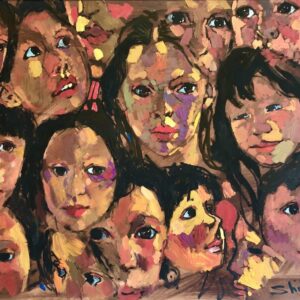
Please stop yourself this Halloween season before saying any of these things out loud. (And read this instead.)
“But it’s totally flattering to your culture when kids dress as ‘Indian Princesses’ and ‘Indian Warriors’! Why are you so offended? It’s just a Halloween costume… Pocahontas is a Disney princess. Do you get upset when kids dress up like Snow White or Sleeping Beauty?”
First of all, princesses like Snow White and Sleeping Beauty don’t tend to be interpreted as stand-ins for all white people ever, whereas Pocahontas/‘Warrior’/‘Indian Princess’ costumes tend to homogenize the diversity of indigenous cultures and/or completely misrepresent real historical people and occurrences. Disney princesses like Snow White are often based on fictional characters, whereas Pocahontas was a real person of the Powhatan Nation whose life and history has been misrepresented almost beyond recognition.
Disney portrays Pocahontas as a young woman who falls in love with European captain John Smith, thereby bringing peace between the Powhatan Nation and the Jamestown settlers. After being saved from execution by Pocahontas, John Smith returns home injured at the end of the film, while Pocahontas stays with her people. John Smith leaves with an open invitation to return to Pocahontas and the Powhatan people someday.
Other than a few critiques about essentializing and homogenizing indigenous cultures, it seems like this could be a nice story. Until you compare it with what really happened to Pocahontas and her people upon the arrival of the British.
Pocahontas’ real name was Matoaka. She would have been a child when the British first arrived to settle Jamestown, perhaps 10 or 11 years old. She was taken prisoner by the English as a teenager, held hostage for more than a year, and only released on the condition that she marry a 28 year old Englishman who had taken a ‘special interest’ in her while in captivity. (Not John Smith, by the way.) In 1616 Matoaka (now known by her Christian married name, Rebecca Rolfe) was taken to England and exhibited as propaganda to garner support for the British colony. Matoaka never returned home. She died at age 21.
Maisha Z. Johnson, writing for Everyday Feminism, compares Matoaka with Anne Frank: both are ‘girls with harrowing stories’. But, writes Johnson, “most of us believe that trivializing Anne Frank’s life is in very poor taste. Can you imagine the outcry if Disney tried to romanticize her diary by aging her into a young woman with a love affair with a Nazi officer and a happy ending?” Johnson takes her comparison one step further: “Now imagine if that Disney movie was mainstream culture’s primary reference for the Holocaust. And if it was marketed to Germans, who were told that the historical figures who oppressed the Jewish people were their country’s heroes.” Imagine the outcry if children dressed as Anne Frank for Halloween instead of, or alongside Pocahontas. Why doesn’t Pocahontas’ harrowing life story deserve the same respect as Anne Frank’s?
We live on a continent where grave colonial atrocities have been committed, silenced, covered up, hints of which are filtering through to public perception through interventions like the Truth and Reconciliation Commission and revisions to public school curriculum in a few provinces. We have been taught settler versions of Canadian and American history in schools – histories that omit and cover up the violence that has been committed against the first inhabitants of this land under the pretense of benevolence, exploration, and ‘civilizing’ missions. Disney’s Pocahontas is an example of this kind of misrepresentation of history. This history denies the extent of the violence perpetrated against indigenous peoples and insists that mostly, everyone lived happily ever after, and things are as they should be. This rendition of the past does violence to indigenous peoples. It teaches children that colonialism wasn’t really that bad, that settlers were heroes, and that, despite a few conflicts, mostly everybody got along. It implies that there’s no need to apologize or make restitution for colonial violence, and that those people who are ‘complaining’ about colonial atrocities and broken treaties must be ‘stuck in the past’; they must be exaggerating about historical injustices that have long since been resolved.
This is racism. When people of settler descent tell the original inhabitants of this land that colonial violence wasn’t that bad. When history ignores, minimizes and glosses over appropriation of land and resources, broken treaties, residential schools, policies of disenfranchisement, laws that forbid indigenous peoples from leaving reserves, voting, or pursuing land claims (not repealed until the 1950s), enforced sterilization and smallpox blankets. When history denies the extent of colonial violence, and refuses to recognize lasting impacts in the present. When history implies that everyone lived happily ever after.
Pocahontas is not an acceptable Halloween costume. It is not ‘a compliment’ when children dress like Pocahontas or generic Indian princesses or warriors for Halloween. As mothers, fathers, aunties, grandparents, big brothers, sisters, cousins, it’s up to us to gently explain to children why they might like to choose a different Halloween costume, and to help them grow up to be caring, considerate and respectful adults.
By Niki Thorne
About the author: Niki lives in Hamilton and is a PhD candidate and teaching assistant at York University. She’s studying how colonial violence becomes silenced and misrepresented through stories of the Canadian past, focusing on Ontario primary-junior curriculum & teacher training.






